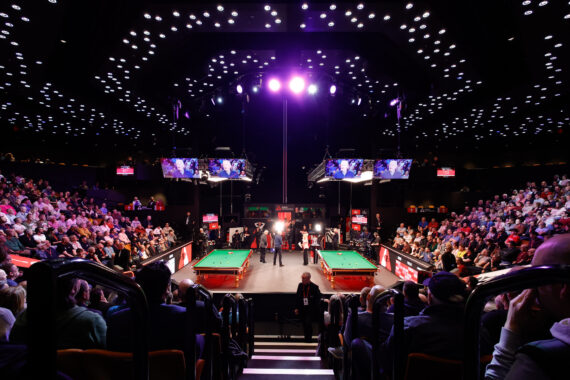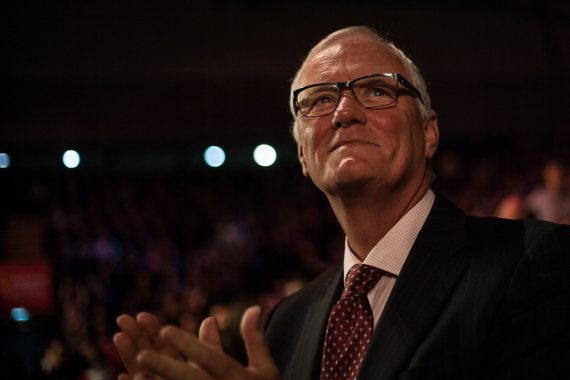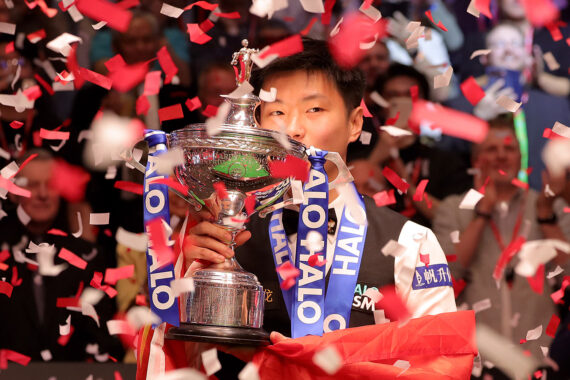The Davis Era – 40 Years On
It is the afternoon of April 20th, 1981, and Steve Davis is making a now familiar route march through the streets of Sheffield, starting at the Grosvenor House hotel and ending at the Crucible theatre, careful to step on the cellar doors outside the Brown Bear pub, a superstition engrained in the pre-match routine for him and his Romford entourage.
It’s a 5pm start for the concluding session of the World Championship final. Davis, 23 years old, leads Doug Mountjoy 14-12. Breaks of 84 and 119 soon extend this to 16-12. He needs two more frames to confirm what his growing reputation has been suggesting, that he is something very special. That he will transform snooker in a new decade.
Britain in 1981 is typically portrayed as a divided nation, with the pomp and ceremony of the marriage of Prince Charles and Lady Diana Spencer contrasting sharply with inner city riots in Brixton, Toxteth and Handsworth. Unemployment had risen by from 1.5 million to 2.5 million in just a year as Thatcherism began to fundamentally change the economic landscape.
The competing images of princesses and petrol bombs present a compelling posh v poor narrative but mask the obvious truth that the vast majority of the population were somewhere in the middle, just getting on with their lives. They had a new soap opera to occupy them in the form of an indoor game which had risen from obscurity to become a huge television ratings puller.
Colour TV had foregrounded snooker through Pot Black and the game, and its varied cast of characters, soon became popular with audiences. The BBC gradually committed to ever increasing amounts of coverage and were rewarded in 1980 with a world final between Cliff Thorburn and Alex Higgins so dramatic that there were complaints when they left the Crucible for live updates of the Iranian embassy siege in London.
These were still fledgling times for snooker. There was only one ranking event – the World Championship – but a circuit was beginning to be fleshed out. Into this world came Davis, backed by his ebullient manager, Barry Hearn.
They had met when Davis, a shy, gawky teenager introduced to snooker by his father, Bill, walked into the Lucania club in Romford, which Hearn owned. He was greeted by the words, “I’ve heard a lot about you.”
Hearn had learned of Davis’s potential from Vic Harris, one of Essex snooker’s leading lights. Harris called Hearn, a shrewd, bright, ambitious accountant, ‘The Guvnor.’
They were opposites – Davis reserved, Hearn brash – but they quickly formed a partnership as Davis’s legend grew in money matches where he earned the nickname ‘the Golden Nugget.’ To Hearn, he was money in the bank.
Davis turned professional in 1978 and in 1980 beat the then defending champion, Terry Griffiths, at the Crucible. At the end of the year, he whitewashed Griffiths 9-0 in the semi-finals of the UK Championship and thrashed Higgins 16-6 in the final to win his first professional title.
Davis was different to the players who had emerged before him. They had typically come from the world of work. They were postmen and miners, steelworkers and insurance salesmen. For Davis, snooker was a career in its own right. His dedication to it was like nothing seen before, an obsession which went beyond mere enjoyment. He was perfectly placed to profit from the happy position in which the sport now found itself.
This was the era before daytime television. BBC1 and 2 simply shut down for hours at a time in the mornings. Thus, there was no live coverage of the morning sessions from the first week of the 1981 World Championship but up to three hours in the afternoons and highlights at night.
At the start of the second week, live morning coverage was instituted, beginning at 11.25 and continuing until 4.50pm. The BBC recognised they had a hit on their hands and Davis, young and apparently clean cut, became an audience favourite. Not everyone liked the rebellious players. As the upcoming royal wedding was to prove, deference still held sway. One might easily imagine a firebrand like Higgins lining up with the rioters, but Davis was set to be accepted by the establishment.
He had endured a scare in the first round when his 8-4 lead over a talented teenager called Jimmy White was almost wiped out until Davis eventually won 10-8.
In successive rounds, he beat his three chief rivals for the title – Higgins (13-8), Griffiths (13-9) and Thorburn (16-10) – to reach the final.
Nostalgically, many look back on these years as non-stop fun, as if the results barely mattered, but these were hard match players not necessarily best disposed to a new kid on the baize muscling in on their territory.
Thorburn in particular disliked sections of Davis’s fan base who had travelled up from Romford to offer vociferous support. After the third session of their semi-final, with Davis leading 12-10, the Canadian angrily confronted him on the way to the dressing rooms.
In Davis’s recollection in his autobiography, Interesting, “Cliff suddenly starts having a go at me. He gets quite abusive as well. I don’t really understand what he is on about – but I am later told that he had made a complaint about somebody in the audience whistling to put him off at some stage… When I closed my dressing room door behind me, the main feeling I had was that I had broken him down. These were not the actions I would associate with somebody who was at one with himself and at the top of his game.”
Davis duly won the match 16-10 to advance to a final against Mountjoy, already a Masters and UK champion. He won the first six frames and though Mountjoy fought back well, the Welshman could never quite get level.
Running towards the winning line, he won those two last frames to clinch victory at 18-12. In the immediate aftermath, Hearn came barrelling on to the stage, almost knocking Davis over in his elation as he hugged him before raising his fists in triumph to the Romford corner of the Crucible. Perhaps, with his commercial instincts, he sensed what was to follow.
Davis would go on to earn millions through his on table dominance of the 1980s and through Hearn’s shrewd entrepreneurial management of his affairs. He became one of Britain’s best known sporting faces, a regular on chat shows, entertainment programmes and generally an ever presence in the culture of the decade.
The satirical comedy programme Spitting Image mocked him for being boring, a persona he played up to. In reality, he was a dedicated and highly driven sportsman who raised standards and became the benchmark for a generation.
Davis would win six world titles, six UK Championships and 28 ranking titles, although in his early years there were not many in which to play. He won over 90 trophies from events big and small, more than any other player, and is still the only snooker player to be named BBC sports personality of the year.
His name seems to have slipped out of the greatest of all time debate. Standards have risen but he set them in the first place. Stephen Hendry modelled his own ice-cool approach on Davis’s impenetrable manner. Ronnie O’Sullivan idolised him as a boy. The influence on John Higgins’s style of play is obvious.
These days, having retired from playing in 2016, Davis lends gravitas to the BBC studio and has a whole new life as part of the Utopia Strong, an electronic music group.
Looking back on 1981, Davis would appreciate the significance of what he had achieved, for himself and his sport.
“Snooker was the flavour of the month,” he said. “It would soon become the flavour of the decade. Sponsors, particularly tobacco companies, loved what they saw and what the game could do for their business. They couldn’t get enough of it. It quickly became a very well paid sport to be involved in.
“To that end, my timing could not have been better. They were exciting times, but to walk into a packed room and hear my name announced as the new world champion mattered more. You can’t buy that at any price.
“This was a team effort by me, my father and Barry. The celebrations at the end said it all. It was the culmination of everything we had worked so hard to achieve.
“We had done it.”
This article first appeared in the April issue of Snooker Scene.



